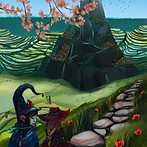
The Land
Falkor. What is not to love about it? Cherry blossoms in spring, vast staggered rice fields, vineyards, colourful flora all year round, ideal weather for the most demanding folk. Anything you can dream of can become true if you live in Falkor, provided you have the coin. Hard work will probably not take you very far.
Despite it is one of the smallest lands in Alor, Falkor holds most of its riches and its most stunning sceneries, making it a top destination for any osvari looking for an expensive holiday never to be forgotten. Aside from its many natural springs, now refurbished into bathhouses, there are many scenic routes and cultural activities, including theatres, museums, operas and the grand Music Palace. One of Falkor's many names is, evidently, the Capital of Arts.
It is said that all roads lead to Falkor. Though there is little evidence to support this claim, it is true that the Council of the world did build its permanent headquarters there. A representative from each land has a permanent seat there, and all opinions are voiced and heard, regardless of the relations between two opposing regions.
It is extremely difficult to spot a single vasariga in Falkor. The land is heavily protected by mahrymic runes that cannot be perceived by the human eye, thanks to the generous investments made by the rich folk of the capital, Falkoria. These runes will turn vasarigæ into flowers, which explains why the Falkorian borders are full of them.
Silks, carpets and a wide range of textile goods are one of the main income sources in the land. However, the Falkorii living in the capital have inherited immense fortunes from their ancestors, living off their hard work. Legend has it, though, that Wine Dragons used to hide their treasures there until their drinking led them to their own extinction.


Mount Falkor
Illustration by Lauma Sliņķe

The Streets of Falkoria
Illustration by Lauma Sliņķe
The Folk
Wealthy, extravagant, beautiful or pompous are a few words used to describe the Falkorii. They are widely known for their extensive customs revolving around hats, a sign of social status that has become popular beyond their land, to the point that a single hat can cost more than a house.
Despite they are often compared to mice owing to their round big ears and big dark pupils, they pride themselves in being richer and more knowledgeable than the average osvari. The symbols on their faces are violet.
Falkorii enjoy long debates and conversations about any subject. They are particularly fond of philosophy, politics, arts and, with no shame or guilt, gossip. Most of these conversations either happen at the many interesting halls in the cities or at the bathhouses.
Very open to new trades and investments, many Falkorii are patrons to aspiring musicians, and sponsor several cultural events, projects, expeditions and inventions.
Though jewels in other regions are rare, they are all over Falkorii's robes in the cities and each gem has its own story, which the Falkori in question will be delighted to tell in excruciating detail.
There is also a vast population living outside of the cities in Falkor, most originally from other lands in Alor. They are easily recognised as they wear no hat and, most importantly, they work. It is not rare for an aspiring musician to work there until they are taken under a patron's wing.
The crime of ugliness should be taken into account when entering a city. The Laws of Beauty change every season, and it is difficult for outsiders to keep track of them.
If you intend to travel to one of Falkor's major cities, don't forget your hat.

Rinni Harunome, Hat Mender
Illustration by Lauma Sliņķe

Aurus Iustari, Beauty Critic
Illustration by Lauma Sliņķe
Specialisations
Many Falkorii pursue mahrym specialisations in Emotion and Thought. Illusion is also an interesting branch for many.
From there, they become experts, critics and artists of all conceivable sorts. They are among the most imaginative osvarii, and will use their mahrym in innovative ways.
A growing current among the Falkorii artists is rejecting mahrym until they have mastered a skill on their own.
Faith
Falkorii consider deities to be a cultural thing, and as such their temples are truly impressive, full of detail and gorgeous architectural designs and sculptures of the major gods and goddesses, with a few popular minor deities.
Generally, gods and goddesses are perceived as ethereal beings that cannot be comprehended by the human mind, who only intervene when it is truly necessary.
The only time a Falkori will visit a temple to pray is when calamities strike or during war. The rest of the time, however, the temples are open for everyone to admire the arts within them, including beautiful murals, listening to the most talented choirs, and reflecting upon the words of the finest-speaking tevtäeræ.
Winter Traditions
Hat Day takes place in Falkor in winter, when the end of the year is nearing. Those fortunate enough to own several hats must carefully choose the ones they'll exchange with their loved ones. No, one can't buy a new one at the hatter's, and also no, one can't give their friend a terrible hat they got from someone else last year.
Hat Day is one of the most thoughtful celebrations in the world of Alor, with a much deeper meaning behind the exchange of hats. Falkorian law observes severe penalties for those who are caught giving out meaningless hats.

Hat Day in Falkor
Illustration by Lauma Sliņķe
Music


